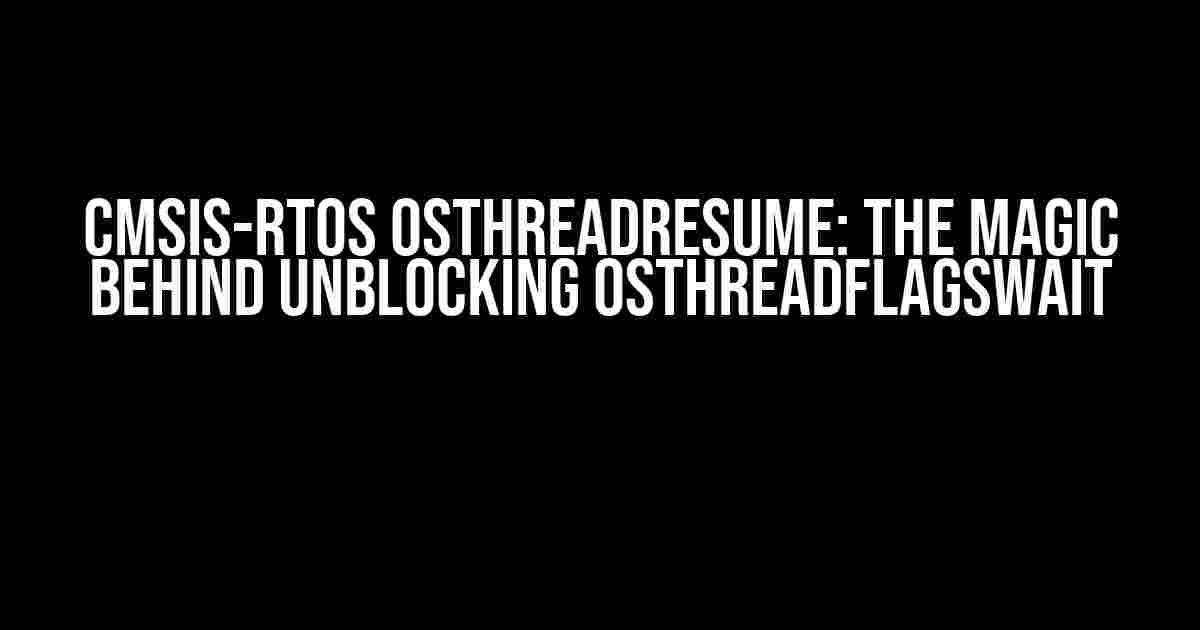Are you tired of dealing with stuck threads and flags that refuse to budge? Look no further! In this article, we’ll dive into the wonders of CMSIS-RTOS osThreadResume and how it can save the day by unblocking osThreadFlagsWait, regardless of the condition. Buckle up, folks, and let’s get started!
What is osThreadFlagsWait?
Before we dive into the magic of osThreadResume, it’s essential to understand what osThreadFlagsWait is and how it works. osThreadFlagsWait is a CMSIS-RTOS function that allows a thread to wait for one or more flags to be set. This function is often used in conjunction with osThreadFlagsSet to synchronize threads and ensure that they don’t execute certain code until a specific condition is met.
#include "cmsis_os.h"
osThreadId_t thread_id;
osThreadFlags_t flags;
// Create a thread
thread_id = osThreadNew(osThread, NULL);
// Wait for flags to be set
osThreadFlagsWait(flags, 0x01, osFlagsWaitAll, osWaitForever);
In this example, the thread will wait indefinitely for the flag 0x01 to be set using osThreadFlagsSet.
The Problem with osThreadFlagsWait
While osThreadFlagsWait is an excellent function for synchronizing threads, it can become a problem when the thread gets stuck waiting for a flag that will never be set. This can happen due to various reasons such as:
- A bug in the code that sets the flag
- A timing issue that prevents the flag from being set
- A resource constraint that prevents the flag from being set
When this happens, the thread will remain blocked, and your system will come to a grinding halt.
Enter osThreadResume
This is where osThreadResume comes to the rescue! osThreadResume is a CMSIS-RTOS function that resumes a thread that is waiting for an event or a flag. When you call osThreadResume, the thread will be unblocked, regardless of whether the condition is met or not.
#include "cmsis_os.h"
osThreadId_t thread_id;
// Create a thread
thread_id = osThreadNew(osThread, NULL);
// Resume the thread
osThreadResume(thread_id);
In this example, the thread will be resumed, even if the flag 0x01 is not set.
How osThreadResume Unblocks osThreadFlagsWait
So, how does osThreadResume manage to unblock osThreadFlagsWait? The answer lies in the CMSIS-RTOS kernel. When a thread calls osThreadFlagsWait, it enters a waiting state, and the kernel removes it from the runnable threads list. The thread remains in this state until the flag is set or a timeout occurs.
When you call osThreadResume, the kernel removes the thread from the waiting list and adds it back to the runnable threads list. The thread is then scheduled to run, and it will execute the code following the osThreadFlagsWait function.
| Function | Description |
|---|---|
| osThreadFlagsWait | Waits for one or more flags to be set |
| osThreadResume | Resumes a thread that is waiting for an event or a flag |
Best Practices for Using osThreadResume with osThreadFlagsWait
While osThreadResume is a powerful function, it’s essential to use it wisely to avoid unexpected behavior. Here are some best practices to keep in mind:
- Use osThreadResume sparingly: Only use osThreadResume when you’re certain that the thread should be unblocked, regardless of the condition.
- Verify the thread state: Before calling osThreadResume, verify that the thread is indeed waiting for a flag using osThreadGetState.
- Handle the aftermath: After calling osThreadResume, ensure that your code handles the scenario where the flag is not set. This may involve resetting the flag or taking alternative actions.
#include "cmsis_os.h"
osThreadId_t thread_id;
osThreadState_t state;
// Get the thread state
state = osThreadGetState(thread_id);
if (state == osThreadWaiting) {
// Resume the thread
osThreadResume(thread_id);
} else {
// Handle other states
}
Conclusion
In conclusion, osThreadResume is a powerful function that can be used to unblock osThreadFlagsWait, regardless of the condition. By understanding how osThreadResume works and following best practices, you can ensure that your system remains responsive and efficient, even in the face of stuck threads and flags.
Remember, with great power comes great responsibility! Use osThreadResume wisely, and you’ll be well on your way to creating robust and reliable systems.
Happy coding, and don’t let those stuck threads get you down!
Frequently Asked Questions about CMSIS-RTOS osThreadResume and osThreadFlagsWait
Get the inside scoop on how osThreadResume and osThreadFlagsWait work together in CMSIS-RTOS!
What is the purpose of osThreadResume in CMSIS-RTOS?
osThreadResume is a function in CMSIS-RTOS that resumes a thread that was previously suspended or blocked. It’s like giving a thread a green light to start running again!
What does osThreadFlagsWait do in CMSIS-RTOS?
osThreadFlagsWait is a function that waits for a signal or a flag to be set. It’s like saying, “Hey, I’ll wait here until you give me the thumbs up to proceed!”
Will osThreadResume unblock osThreadFlagsWait regardless of the condition?
Yes, that’s correct! Even if the condition isn’t met, osThreadResume will still unblock the thread that’s waiting on osThreadFlagsWait. It’s like a “get out of jail free” card for the thread!
Why would I use osThreadResume with osThreadFlagsWait?
You might use osThreadResume with osThreadFlagsWait to implement a timeout or a way to cancel a thread that’s waiting for a signal. It gives you more control over your threads and allows for more complex scenarios!
Are there any potential pitfalls to watch out for when using osThreadResume with osThreadFlagsWait?
Yes, be careful not to create a situation where a thread is unblocked but still waiting for a signal that will never come. This could lead to unexpected behavior or even system crashes! Always make sure to handle your threads with care!

